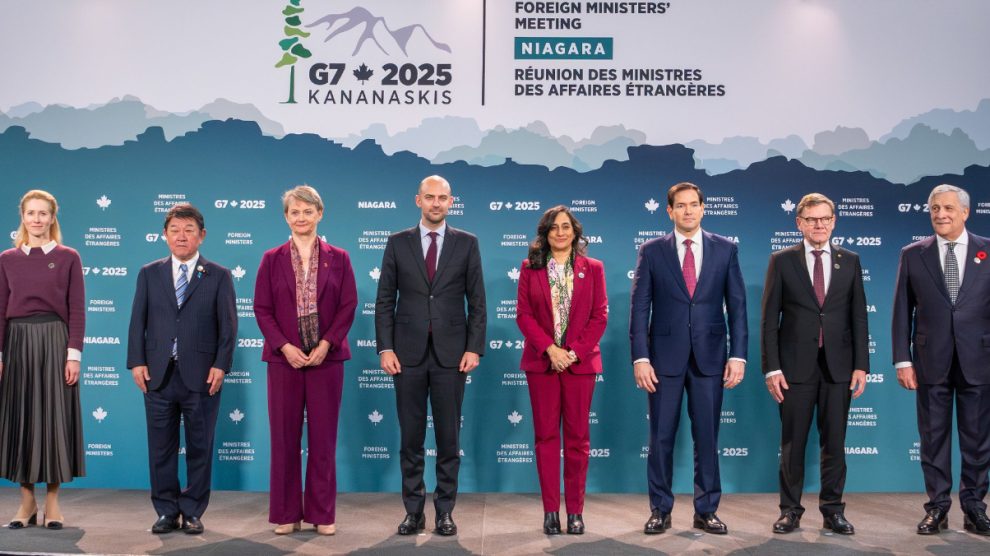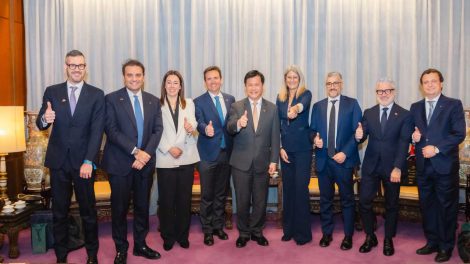The summit, held in southern Ontario under Canada’s presidency, is dominated by the key dossiers on Ukraine, Gaza, and global security. Ministers are also discussing defence spending, trade, and supply-chain resilience, against the backdrop of renewed U.S.-Canada trade tensions following tariffs imposed by President Donald Trump.
Decoding the News: For Italy, the priority is to strengthen its credibility as a stabilising and mediating actor.
- Rome seeks an operational role in Gaza’s reconstruction — Italy and the United States are co-leading the discussion on Middle East issues.
- On Ukraine, Italy reiterates full political and logistical support for Kyiv, focusing on energy resilience and industrial reconstruction, though domestic debates continue over arms supplies.
- At the same time, Italy is pushing for tighter cooperation among G7 partners on supply chains and critical minerals to reduce strategic dependence on Beijing.
Zoom Out: The Canadian meeting comes at a time of shifting global balances: U.S. pressure on NATO partners to boost defence spending, competition with China over resources, and the fragile equilibrium in the Middle East make this G7 a test of Western cohesion.
- With invited strategic partners such as Saudi Arabia, Brazil, South Korea, India, Mexico, South Africa, and Ukraine, the summit aims to deepen dialogue between the Global North and South — a priority consistent with Italy’s foreign policy vision as a “bridge” nation.
What He’s Saying: Speaking to the media on the sidelines of the summit, Minister Tajani said:
- Middle East and Gaza: “Italy’s commitment in the Middle East will be significant — we’ll see what form it takes: it could mean training Palestinian police or contributing to civil administration. Italy will play a constructive role, especially as we organise the Cairo Conference.”
- “We’ve already decided to invest €60 million in Gaza’s reconstruction, with the first €5 million already delivered. We must ensure the truce holds and that aid and food reach the population.”
- “Our envoy has been to Jordan, Ramallah, Israel, and Egypt, and will soon travel to the United States to ensure Italy plays a leading role in the reconstruction and the peace process.”
- Russia and Ukraine: “The Russian offensive is not one of great victories. For three years, they’ve claimed to be winning the war, and they still haven’t. We must keep working toward a ceasefire and force Putin to come to more reasonable terms.”
- China and Raw Materials: “We cannot allow China to dictate the price of raw materials — our competitiveness depends on it.”
- Sudan and Humanitarian Aid: “We hope to achieve a ceasefire between the two sides. Italy is organising substantial aid: a plane and a ship carrying supplies for children will arrive in Port Sudan before Christmas. We also need to engage interlocutors such as the Gulf countries.”
- In a background note, the Italian Foreign Ministry recalled the recent launch of the “Italy for Sudan” initiative, underlining the need to increase humanitarian flows and confirming a new aid shipment to support the most vulnerable — including children and displaced persons, whose plight is also affecting migration dynamics in Libya.
Focus on Maritime Security. One of the G7 sessions focused on maritime security and prosperity, following up on the March G7 Declaration that relaunched efforts to secure supply chains, combat piracy, and protect undersea infrastructure.
- “On maritime security — particularly in light of the Indo-Mediterranean corridor (IMEC) — India is a crucial partner,” noted the Italian Foreign Ministry.
- The discussion is especially timely given the Houthis’ recent announcement of a temporary halt to attacks along Indo-Mediterranean routes.
The Bottom Line: At the G7 meeting, Italy reaffirmed its readiness to contribute to the governance, stabilisation, and reconstruction of international crisis zones — offering political leadership and technical-operational support.
(Photo: X, @G7)





